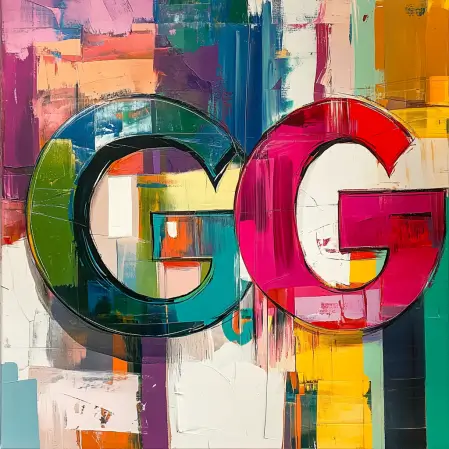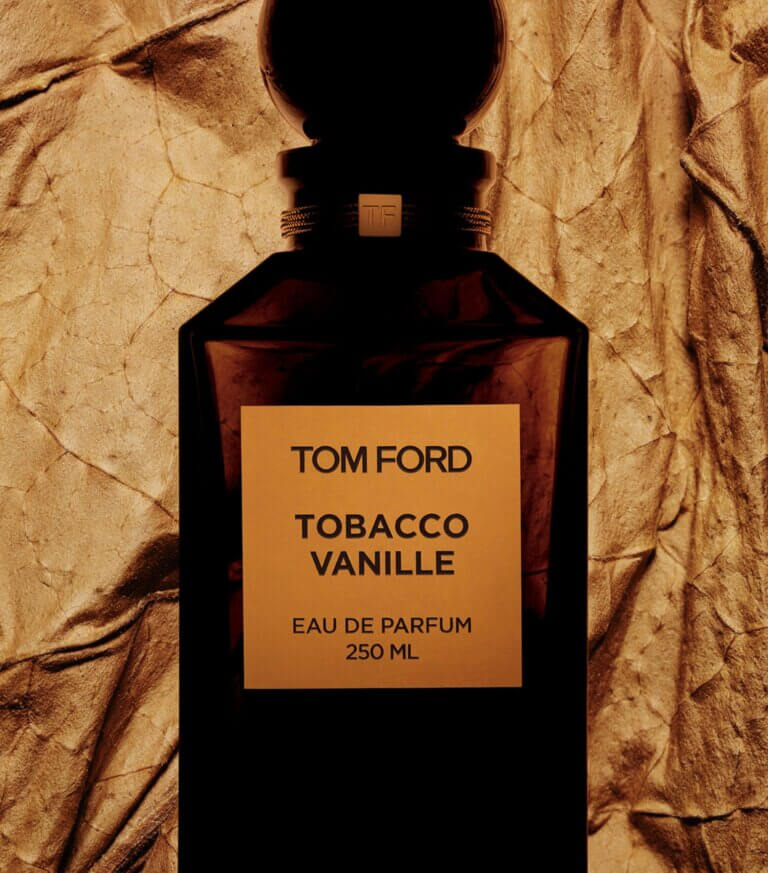As we enter 2024/25, artificial intelligence (AI) is continuing to reshape the luxury fashion industry in profound ways. From optimizing supply chains to enhancing customer experiences, AI is transforming how luxury brands operate, design, and engage with consumers. High-end fashion houses such as Prada, Gucci, Moncler, and Valentino are spearheading this shift, blending machine learning and generative AI with traditional luxury values.
Yet, this transformation presents a challenge: how can brands integrate cutting-edge technology without sacrificing the essence of luxury? In a market where craftsmanship and human touch are paramount, can AI enhance without diluting? This article explores how AI is impacting the luxury sector in 2024/25, analyzing key trends, consumer perceptions, and the role of sustainability, while offering insights into how brands can maintain their prestige in an increasingly AI-driven world.
AI’s Explosive Growth in Luxury Fashion: A 2024/25 Perspective
AI is now seen as a game-changer in luxury fashion. According to McKinsey, generative AI is poised to add up to $275 billion to the luxury and fashion industry’s profits by 2025. This explosive growth is driven by the $42.6 billion market that emerged in 2023, where AI is revolutionizing how brands develop products, personalize experiences, and manage operations.
In 2024, AI is no longer a novelty but a necessity in luxury fashion. Whether it’s AI-powered personalization engines that deliver tailored product recommendations or machine learning algorithms that predict fashion trends, AI is becoming integral to offering bespoke experiences that resonate with high-end consumers.
How Luxury Brands are Leading the AI Revolution
1. Valentino: Redefining Creativity Through AI
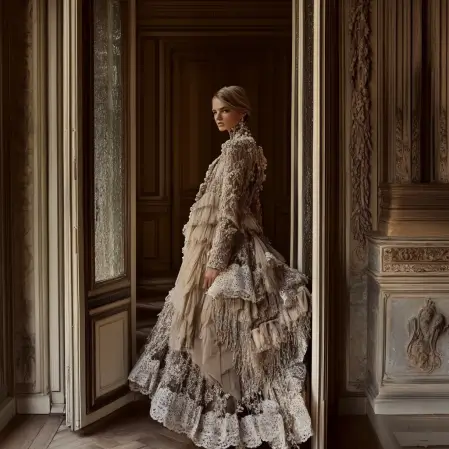
Valentino has embraced AI as a creative tool since early 2023 with its Essential campaign, which showcased a blend of human and machine-generated imagery. In 2024, Valentino has advanced its use of AI-powered styling assistants, offering customers personalized wardrobe suggestions based on their preferences, purchase history, and even upcoming trends. Valentino’s use of machine learning to generate creative content highlights how AI can enhance design while staying true to luxury’s handcrafted nature.
If you’re inspired by Valentino’s approach to innovation, consider exploring AI-powered tools for your business. Shopify Plus offers advanced AI-driven personalization features that can help luxury brands enhance their customer experience by providing tailored product recommendations and optimizing inventory.
2. Moncler: Revolutionizing Fashion with AI
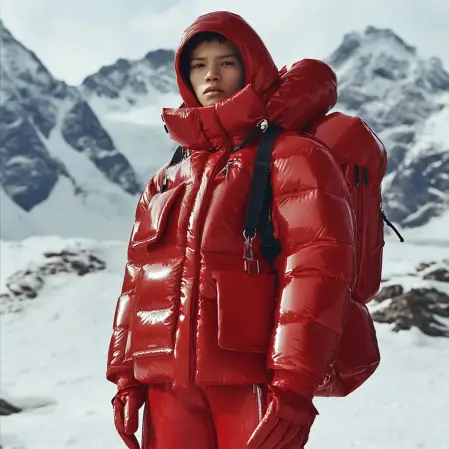
In collaboration with Maison Meta, Moncler launched its first AI-driven campaign during London Fashion Week 2023. Known for its iconic puffer jackets, Moncler used AI-generated visuals to enhance the customer journey and capture the imagination of fashion enthusiasts worldwide. Heading into 2025, Moncler plans to use predictive analytics powered by AI to ensure that its collections are always aligned with emerging trends, giving the brand a competitive edge by offering on-demand luxury.
For brands looking to integrate predictive analytics, Tableau is an excellent option. Tableau allows businesses to harness the power of AI to predict customer trends, manage inventory efficiently, and optimize business operations—all crucial for the luxury market.
3. Prada: Leading Innovation in Beauty and Fashion
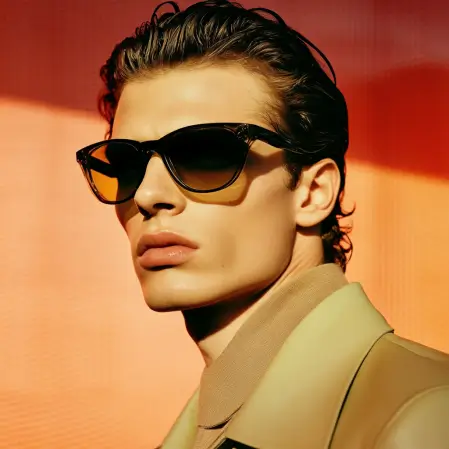
Prada was among the first luxury brands to embrace AI-driven beauty solutions, launching its AI-powered makeup shade recommendations in 2023. By 2025, Prada Beauty will expand its offerings by integrating virtual try-on technology for makeup and fragrance lines. This technology allows consumers to experience products in real-time using augmented reality (AR), giving them the convenience of online shopping with the immersive experience of in-store browsing.
If you’re interested in integrating virtual try-on technology for your beauty or fashion brand, check out ModiFace, an industry leader in AR-powered virtual beauty try-on solutions. By incorporating tools like ModiFace, luxury brands can offer personalized, immersive shopping experiences that drive customer engagement.
4. Gucci: Blurring the Lines Between Art, AI, and Fashion

Gucci’s collaboration with Christie’s Web3 platform in 2023 was a significant step toward integrating AI and NFTs into the luxury fashion space. Through its AI-informed digital art auctions, Gucci blurred the lines between art, technology, and fashion, offering exclusive AI-generated NFTs that fetched as much as $417,000.
Luxury brands looking to capitalize on the growing trend of AI-generated NFTs can explore platforms like OpenSea, the largest NFT marketplace. This allows brands to enter the NFT space and engage with tech-forward luxury consumers seeking exclusive digital assets.
The Role of AI in Customer Personalization
In the world of luxury, personalization is paramount. Consumers who invest in high-end products expect more than just a purchase—they want an experience that feels tailored to them. In 2024/25, AI-driven recommendation engines are becoming the backbone of luxury e-commerce, enabling brands to offer tailor-made shopping experiences based on an individual’s preferences, browsing history, and even real-time interactions.
Brands like Zegna are using AI-powered configurators that allow consumers to customize their purchases down to the finest details, from fabric to fit. This ability to customize at scale is transforming luxury retail, making it more accessible to the discerning customer while still upholding the one-of-a-kind experience that luxury brands are known for.
For businesses looking to implement similar recommendation engines, consider Dynamic Yield. This platform specializes in creating personalized customer journeys by leveraging AI to make product recommendations and customize content for each visitor.
Ethical Considerations and Consumer Perception
While AI offers luxury brands significant advantages, it also presents challenges—particularly around the perception of authenticity. In 2024, a growing number of consumers are questioning whether AI-generated products can match the authenticity and craftsmanship of their traditional counterparts. Concerns about job displacement in industries like modeling, as seen in Levi’s backlash over AI-generated models, have raised ethical questions.
Luxury brands must navigate these concerns by integrating AI in ways that enhance creativity, rather than replace it. Transparency around how AI is used and the incorporation of sustainable AI practices will be key to maintaining trust with consumers who value both innovation and ethically produced goods.
For businesses aiming to ensure ethical AI use, IBM Watson offers AI solutions that prioritize transparency, explainability, and responsible AI use.
AI and Sustainability in Luxury Fashion
As the fashion industry grapples with sustainability challenges, AI is emerging as a critical tool in reducing environmental impact. In 2024/25, luxury brands like Louis Vuitton and Burberry are using AI to optimize fabric usage, reduce waste, and streamline supply chain logistics. By using AI algorithms to predict demand and optimize production, these brands are lowering their carbon footprints while maintaining their commitment to quality and craftsmanship.
To integrate sustainability-focused AI into your supply chain, explore SAP’s Sustainability Solutions. SAP offers tools that allow businesses to monitor and reduce their environmental impact while ensuring sustainable production practices.
The Future of AI in Luxury: A Look Ahead
As we approach 2025, the role of AI in the luxury fashion industry will continue to evolve. Augmented reality (AR), virtual fitting rooms, and blockchain authentication will become staples of the luxury shopping experience, offering consumers more immersive, personalized interactions with brands. Meanwhile, AI’s ability to analyze customer data and predict trends will allow luxury brands to stay ahead of consumer demands, further solidifying their market position.
The future of AI in luxury fashion is not just about streamlining operations; it’s about creating an entirely new level of consumer engagement, where technology and artistry meet to deliver unparalleled customer experiences.
Conclusion: AI as a Catalyst for Luxury’s Next Chapter
AI is no longer just a buzzword; it is a critical component of the luxury fashion industry’s growth strategy. Brands that can successfully integrate AI while maintaining their commitment to craftsmanship, authenticity, and exclusivity will thrive in the competitive landscape of 2024/25.
For luxury brands, now is the time to invest in AI-driven solutions that enhance personalization, sustainability, and customer engagement. The future of luxury is digital, but it’s also personal, and AI is the key to unlocking this next chapter of innovation and growth.

